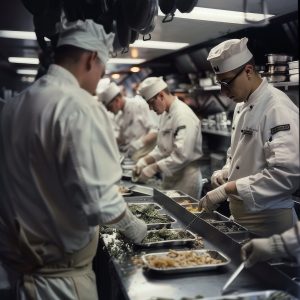Hospitality Management Programs: The Lodging Operations Course
Lodging operations courses are essential for anyone looking to enter or advance in the hospitality industry. These courses offer in-depth knowledge and practical skills to manage various aspects of hotel and lodging businesses, from front desk operations and housekeeping to guest services and revenue management. Whether you aim to become a hotel manager, a front office supervisor, or a director of operations, a solid understanding of lodging operations is crucial.
These courses typically cover topics such as customer service excellence, property management systems, financial management, and the latest trends in hospitality technology. By focusing on real-world scenarios and case studies, lodging operations courses provide students with the hands-on experience to solve common industry challenges, making them competent and skilled professionals.
In addition to technical skills, these courses emphasize the importance of soft skills, such as communication, leadership, and problem-solving, which are crucial to running a successful lodging business. As the hospitality industry continues to grow and evolve, those with a strong foundation in lodging operations will be well-equipped to meet the demands of both guests and employers, ensuring a rewarding career in this dynamic field.
The Lodging Operations Courses
Here are some courses typically offered in lodging operations, along with brief descriptions:
- Front Office Operations
This course covers the key responsibilities of the front desk, including check-in/check-out procedures, reservation management, guest services, and handling customer complaints. Students learn to manage front office operations efficiently and maintain high guest satisfaction. - Housekeeping Management
This course focuses on managing housekeeping operations, including room cleaning schedules, inventory control, and maintaining high cleanliness and safety standards. It also addresses staff management and training within the housekeeping department. - Revenue Management
Teaches strategies for optimizing room rates, occupancy, and overall hotel revenue. Students learn to analyze market trends, understand demand forecasting, and implement pricing strategies to maximize profitability. - Property Management Systems (PMS)
provides hands-on training with property management software, a critical tool for handling reservations, room assignments, and guest information. This course equips students with the technical skills to manage hotel operations efficiently. - Guest Services and Relations
Focuses on creating memorable guest experiences through exceptional customer service. Students learn techniques for handling guest inquiries, resolving complaints, and enhancing guest satisfaction through personalized service. - Hospitality Law and Ethics
This course covers the legal aspects of lodging operations, including contracts, liability, safety regulations, and ethical issues. It helps students understand the legal framework within which hotels operate, ensuring compliance and risk management. - Facilities Management
Explores the maintenance and management of hotel facilities, including energy management, security, and equipment maintenance. Students learn how to ensure the smooth operation of the physical aspects of the property. - Food and Beverage Operations
This course introduces students to managing hotel restaurants, bars, and catering services. It covers menu planning, cost control, and service standards to ensure high-quality dining experiences for guests.
Leadership
Leadership is crucial in lodging operations, impacting a hospitality establishment’s efficiency, culture, and overall success. Effective leadership ensures that all departments within a lodging facility work cohesively towards common goals, such as guest satisfaction, operational excellence, and financial performance. Here’s how leadership fits into various aspects of lodging operations:
- Strategic Planning and Vision:
Leaders set the strategic direction for the lodging establishment. They develop and communicate a clear vision, mission, and goals that align with the hotel’s brand and objectives. Effective leaders inspire their teams to work towards achieving these goals, ensuring that everyone is on the same page. - Team Management and Motivation:
Leadership is essential for managing and motivating staff across all departments, including front office, housekeeping, food and beverage, and maintenance. A strong leader fosters a positive work environment, promotes teamwork, and encourages continuous improvement. By recognizing and rewarding good performance, leaders keep employees motivated and engaged. - Guest Experience:
Leaders play a crucial role in shaping the guest experience by setting high standards for customer service and ensuring that these standards are consistently met. They train and guide staff on handling guest interactions, resolving issues, and exceeding expectations. A leader’s commitment to exceptional service often trickles down to the entire team. - Crisis Management:
Strong leadership is critical in the face of unexpected challenges, such as natural disasters, health emergencies, or operational disruptions. Leaders must make quick, informed decisions to protect guests, employees, and the property. They also communicate effectively with staff and guests to manage the situation and maintain trust. - Operational Efficiency:
Leaders oversee the efficiency of day-to-day operations by coordinating the activities of different departments. They ensure that processes are streamlined, resources are allocated effectively, and any operational issues are promptly addressed. Leaders also encourage innovation and the adoption of new technologies to improve efficiency. - Training and Development:
A key leadership responsibility in lodging operations is the ongoing training and development of staff. Leaders identify skills gaps, provide opportunities for professional growth, and mentor employees. This not only improves staff performance but also helps in retaining top talent. - Ethical Standards and Compliance:
Leaders are responsible for maintaining ethical standards and ensuring all operations comply with legal and regulatory requirements. They set the tone for ethical behavior within the organization and promote integrity and accountability at all levels. - Financial Oversight:
Leadership involves overseeing the financial health of the lodging operation. Leaders make decisions about budgeting, pricing strategies, cost control, and investments. They are responsible for ensuring the establishment remains profitable while delivering high-quality service to guests.
Leadership is the glue that holds lodging operations together, ensuring that all aspects of the business function smoothly and effectively. Solid leadership can help a lodging establishment achieve operational excellence, provide outstanding guest experiences, and maintain a competitive edge in the hospitality industry.















